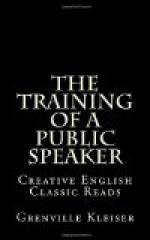DO NOT ABUSE YOUR OPPONENT
Some are very liberal in abuse of the advocate of the opposing party, but unless he has brought it upon himself, I think it is acting very ungenerously by him, in consideration of the common duties of the profession. Add to this that these sallies of passion are of no advantage whatever to him who pleads, the opponent having, in his turn, an equal right to abuse; and they may even be harmful to the cause, because the opponent, spurred on to become a real enemy, musters together all the forces of wit to conquer if possible. Above all, that modesty is irrecoverably lost which procures for the orator so much authority and belief, if once departing from the character of a good man, he degenerates into a brawler and barker, conforming himself not to the disposition of the judge, but to the caprice and resentment of the client.
Taking liberties of this kind frequently leads the orator to hazard some rash expressions not less dangerous to the cause than to himself. Pericles was accustomed to wish, with good reason, that no word might ever enter his mind which could give umbrage to the people. But the respect he had for the people ought in my opinion to be had for all, who may have it in their power to do as much hurt; for the words that seemed strong and bold when exprest, are called foolish when they have given offense.
THOROUGH PREPARATION ESSENTIAL
As every orator is remarkable for his manner, the care of one having been imputed to slowness, and the facility of another to rashness, it may not be amiss to point out here a medium. Let him come for pleading prepared with all possible care, as it must argue not only neglect, but also a wicked and treacherous disposition in him, to plead worse than he can in the cause he undertakes, therefore he should not undertake more causes than he is well able to handle.
He should say things, studied and written, in as great a degree as the subject can bear, and, as Demosthenes says, deeply engraven, if it were possible, on his memory, and as perfect as may be. This may be done at the first pleading of a cause, and when in public judgments a cause is adjourned for some time before it comes to a rehearsing. But when a direct reply is to be made, due preparations are impracticable; and even they who are not so ready find what they have written to be rather a prejudice to them if anything unexpectedly is brought forward; for it is with reluctance that they part with what they have prepared, and keeping it in mind during the whole pleading, they are forced to continually wonder if anything can be taken from it to be included in what they are obliged to speak extempore. And tho this may be done, there will still be a lack of connection, and the incoherence will be discoverable from the different coloring and inequality of style. Thus there is neither an




